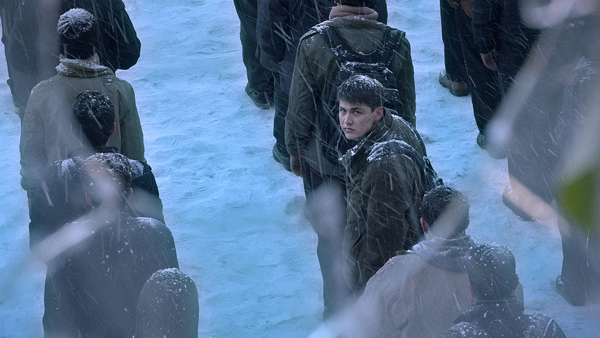Family of Straw: Amirfazli & Ghasemi Present a Trilogy of Familial Tragedies
The title, of course, is a bitter irony relating to Iran’s self-anointed nickname, something directors Raha Amirfazi and Alireza Ghasemi completely dismantle by the final frames of their impressive debut, In the Land of Brothers. A triptych following three members of the same Afghan family across a period of twenty years of living as refugees in Iran, neither a conception of opportunity nor fraternity seems actually possible for those who fled their Taliban controlled country in 2001. Part of this is their inability to obtain citizenship, creating an endless cycle of being stuck in survival mode. However, this conveniently allows for their entrenched vulnerability to a host culture which seems more than happy to exploit these cheap human resources. Although this a film which avoids feeling like abject miserabilism, it’s certainly an unhappy portrait deepened irreparably by time. And this is certainly a family whose unhappiness becomes crystallized as unique in its tragic scope.
In its opening moments, we’re informed Iran is host to five million Afghan refugees. We should immediately note the use of the word ‘host’ and not home,’ considering their new environment is more likely to be ‘hostile.’ Although we don’t know it at the moment, we’re introduced to principal members of one family in the first chapter, titled Mohammad, set in Bojnard, 2001. The centerpiece of this chapter (Mohammad Hosseini) is a student at a trade school, picked up by Iranian police after class ends one day. Not having his identification card allows them to transport him to the local police station where he, alongside a handful of other refugees, have been selected for unpaid labor cleaning up the local station. Such begins a routine cycle exacerbated by one of the officers clearly finding Mohammed attractive, forcing him to injure himself as the only reprieve from the abuse. We fast forward ten years to Bandar Anzali, where Leila (Hamideh Jafari) works for a wealthy Iranian couple alongside her husband, Hussein, who she has just found dead in their home.
With a young son in tow, Leila is forced to hide her husband’s body until she can escape from her employers, because if the police are called, she’ll be deported along with her son. Lastly, in 2021 Tehran, the elderly Qasem (Bashir Nikzad) has just been informed his son has died fighting for Iran in Syria. The news arrives at the same time it is announced Iran will bestow citizenship upon Afghan families who have been in the country for forty years. However, he doesn’t know how to tell his wife prior to the ceremony which will at last allow them stability.

In the metaphorical title for Betty Smith’s classic A Tree Grows in Brooklyn, there was at least the sense of hope for a life to be lived, enjoyed even in the most barren of landscapes. And that’s because there was an opportunity for ‘roots.’ The final slap of the film’s third segment delivers its harshest, if most perpetual, blow. Although the elderly surviving members have finally received citizenship, their deceased children, martyred in Syria for a country which didn’t offer them equal status, will have no legacy and no history in this land. Although these kinds of human tendencies are hardly unique to Iran, as almost every developed nation has somehow condoned the exploitation of cultures foreign to their own, Amirfazli and Ghasemi have chosen to highlight a specific perspective across a particular era which has heretofore remained invisible in most realms.
In several ways, In the Land of Brothers resembles something like Fatih Akin’s celebrated The Edge of Heaven (2007) through its interconnected but separate tales of tragedy. However, there is a deliberate, matter-of-fact approach across these three episodes of woe which sidesteps sensationalism or sentimentality. In some ways, In the Land of Brothers is a cold, brittle film, as easy to break apart as its central family, lost to one another and eventually to time. Although the passage of time across three distinct periods isn’t as visually obvious, cinematographer Farshad Mohammadi captures a separate mood in the film’s three segments, navigating from Bojnard, Bandar Azali, and ultimately Tehran, home of an empty dream for one family’s surviving members.
Reviewed on January 22nd at the 2024 Sundance Film Festival – World Cinema Dramatic Competition section. 95 mins.
★★★½/☆☆☆☆☆


